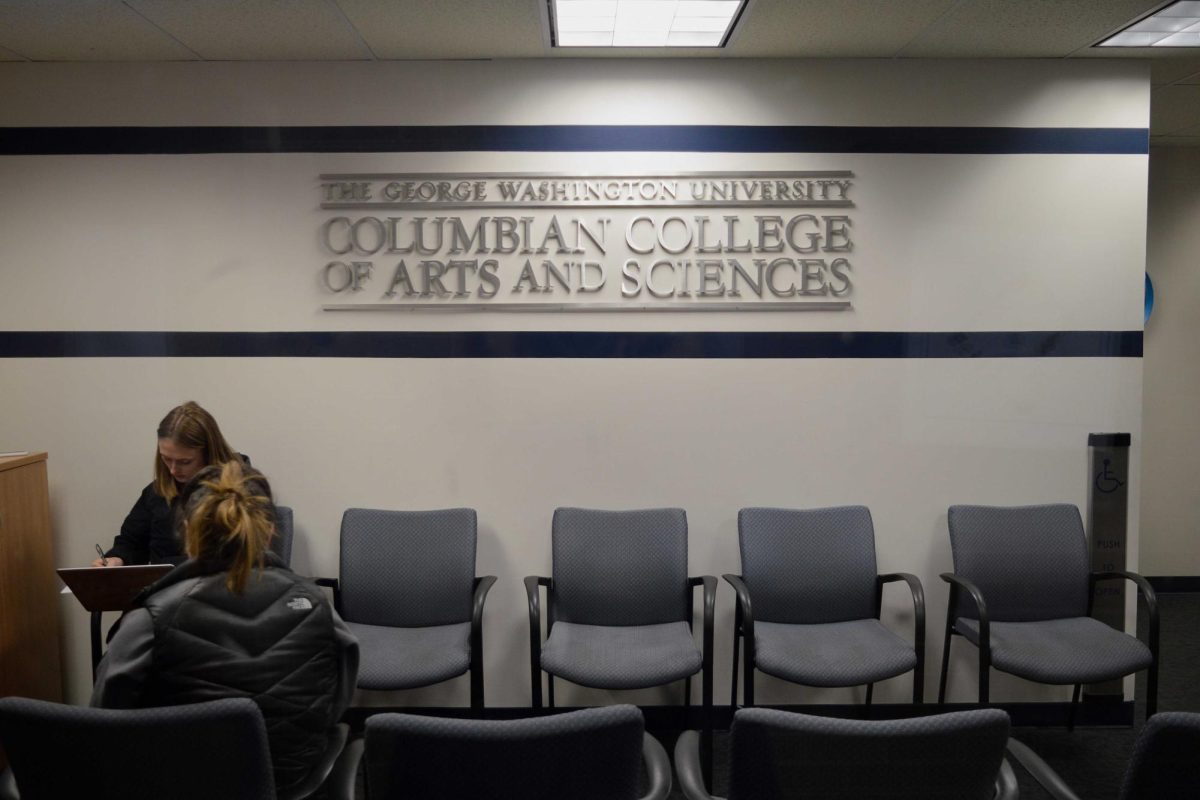Updated: Jan. 19, 2024, at 2:42 p.m.
Officials at the Columbian College of Art & Sciences told department chairs to accommodate a 15 percent budget cut to their department’s fiscal year 2024 budget last spring and reified the reduction last semester.
Kimberly Gross, the CCAS vice dean for programs and operations, said the school’s officials asked CCAS departments, programs and college offices to cut 15 percent of their expected noncompensation spending to meet the budget target for CCAS set in late March by GW for fiscal year 2024. She said CCAS officials later informed department and program heads of further cuts in September after the school failed to reach the “needed expense savings” in the spring following summer budget meetings to meet the college’s budget margin for FY 24, which involved cutting tenured faculty’s travel reimbursements.
“We determined that we needed to reduce the non-compensation spending requests for FY24 from college offices, departments and programs by 15%,” Gross said in an email. “We are continuing to discuss the FY24 budget with the university finance officials.”
Officials and department heads did not specify the expenses that would be included in the cut to noncompensation spending. The decision on what to cut from departments and programs’ requested budgets was left up to department chairs and program directors.
Gross declined to say if the cuts were a permanent change and added that officials regularly evaluate the budget, which mostly consists of compensation and depends on the college’s revenue and spending margin that the University gives to the college. The college’s revenue and compensation factors include items like the number of graduate students starting in CCAS programs, revenue based on undergraduate enrollment and potential savings on compensation costs, Gross said.
“We prioritize the most important aspects of educational and research mission as we work to meet the margin,” Gross said.
In a Faculty Senate meeting Friday, Provost Chris Bracey said the budget cuts are isolated to CCAS and that he and Bruno Fernandes, the executive vice president and chief financial officer, are working with CCAS Dean Paul Wahlbeck to address the budget concerns.
Katrin Schultheiss, an associate professor of history and faculty senator, said the budget cuts harm faculty morale because officials don’t tell professors a “straight story” in their explanations of the reasoning for the cuts. She said officials have given faculty a variety of reasons that feel unsatisfactory because the root of the issues go unexplained.
“I wish there was better communication between the CCAS administration and the faculty to explain why we have this,” Schultheiss said. “To say we have revenue issues is kind of like what’s the root of those revenue issues? Why is there an imbalance between revenue and expenses if that’s in fact the case?”
Schultheiss added that budget reports presented in senate meetings project a “rosy” picture of the University’s financial standing, while individual colleges often report financial problems that don’t reflect the University’s greater finances. She said University President Ellen Granberg did not give her a clear answer about why the discrepancy in finances between the colleges and the University exists when she asked during a November senate meeting and added that officials have not presented CCAS faculty with a financial report.
Gross said directors and chairs share their spending requests with officials while they’re creating the budget.
In a senate meeting in December, Associate Vice President and University Comptroller Neena Ali reported that the University had gained $24 million in assets in FY 23 and that officials could cash in some of GW’s investments in the case of an emergency. She also reported that the University had $2.8 billion in investments and $5 billion in total assets for FY 23.
“At the last two CCAS faculty meetings where all the CCAS faculty meet with the dean, the dean hasn’t presented a report on the college, there’s been no report on the college. So a lot of us are just left speculating and shaking our heads and wondering what is going on,” Schultheiss said.
This post was updated to correct the following:
The Hatchet incorrectly reported that University officials told CCAS to accommodate a 15 percent budget cut. CCAS officials told department chairs and program directors to make the cuts based on a margin set by the University. We regret this error.





